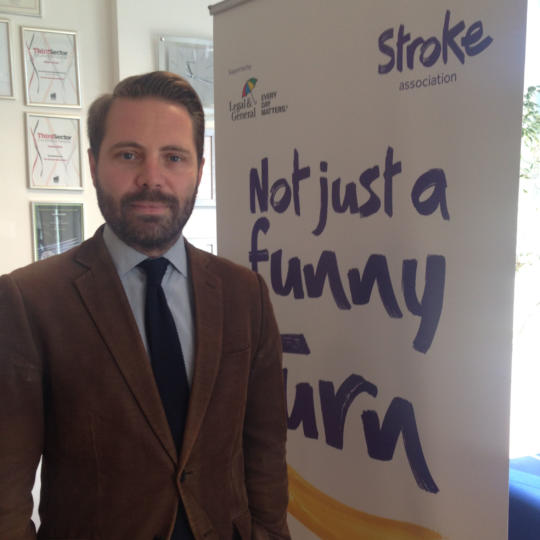The Stroke Association has ambitious plans to grow its income from corporate partnerships from just over £1m to £5m a year by 2018, according to James Hails, its head of corporate partnerships.
As the charity announced its new £2m partnership with the Royal Mail Group, Hails (pictured) tells Civil Society News that the Stroke Association has been taking a more targeted approach to working with companies, which has seen fundraising from that sector more than double over the past two years.
The two-year partnership, which aims to raise at least £2m through employee fundraising, matched by up to £1m from Royal Mail, is the charity’s largest ever and Hails believes a taste of things to come.
He says the charity won the staff vote in May after it was able to demonstrate there was a clear need to get people talking about strokes and get them involved in prevention.
“Strokes are the third biggest killer in the UK and the second biggest in the world. It is the biggest cause of complex adult disability, but it is an issue that is not really getting the attention it deserves,” he says. “We’ve had some great campaign wins and media coverage, but we have not really managed to get stories about stroke survivors out in the community in the way we need to.”
The partnership will specifically provide Life After Stroke grants to support 10,000 stroke survivors, but it will also give the charity the opportunity to engage with the company’s 150,000 staff members and the 29 million customers and 79 million businesses Royal Mail delivers to.
Royal Mail has given the charity a presence on its website, Hails says.
“It is fantastic getting access to their publications and communications channels.”
Hails joined the Stroke Association in 2011 and the charity has been working with a new corporate partnerships strategy over the past two years.
Two years ago the charity, which had a total income of £31.1m, including voluntary income of £18.3m in the year to March 2014, raised around £500,000 a year from corporate partnerships, which has grown to more than £1m this year. Hails says it plans to raise £5m a year by 2018.
“Time and time again we were coming second,” he says. “We had to look at it and ask 'Is this the best approach?' And we knew we needed to be more focused and more targeted in who we should partner with, not who we can partner with.”
The charity looked at which partnerships would benefit it most, Hails says: “Where’s the synergy and the mutual benefit, what are the challenges and bottlenecks they can help us overcome?”
Long lists were turned to short lists of companies the charity should approach. One issue the charity wanted to overcome was not enough people knowing about it, so it looked for companies with large volumes of staff covering large areas of the UK, with first rate comms channels, Hails says. Royal Mail came top of the list.
Hails says the £5m a year by 2018 target is “still not enough”. “When you talk to other charities that are doing a fantastic job generating more income from corporate partnership, I think we need to raise our game and get on to that scale,” he says. “Stroke has been a silent killer for too long. We absolutely feel there is enough space to radically grow the size and scale of our corporate partnerships. We think we can raise a lot more.”
Hails believes that a commercially aware and single-minded mission is key to securing big corporate partners. “Successful charities believe that the company should partner with them to overcome this very specific issue and also make it relevant to their business,” he said.
The Stroke Association has recently had a partnership with Legal & General during Action on Stroke month in May that raised funds and awareness about recognising the signs of a stroke.
A charity of the year partnership with the law firm Herbert Smith Freehills raised £113,000 and the charity also benefits from pro bono work.
“I think non-cash benefits builds legitimacy of the partnership,” he says. “If you are just raising funds you are a corporate fundraising department; if you are raising funds and securing pro bono it is a real partnership.”
Next, Hails is hoping to add some big high street names to its list of charity partners.
“The Stroke Association is at a really exciting point. We know we’ve not been raising enough income in previous years and that has changed. We’ve got significant growth plans and lots of ideas, we absolutely think there is room to grow and manoeuvre in this area.”










